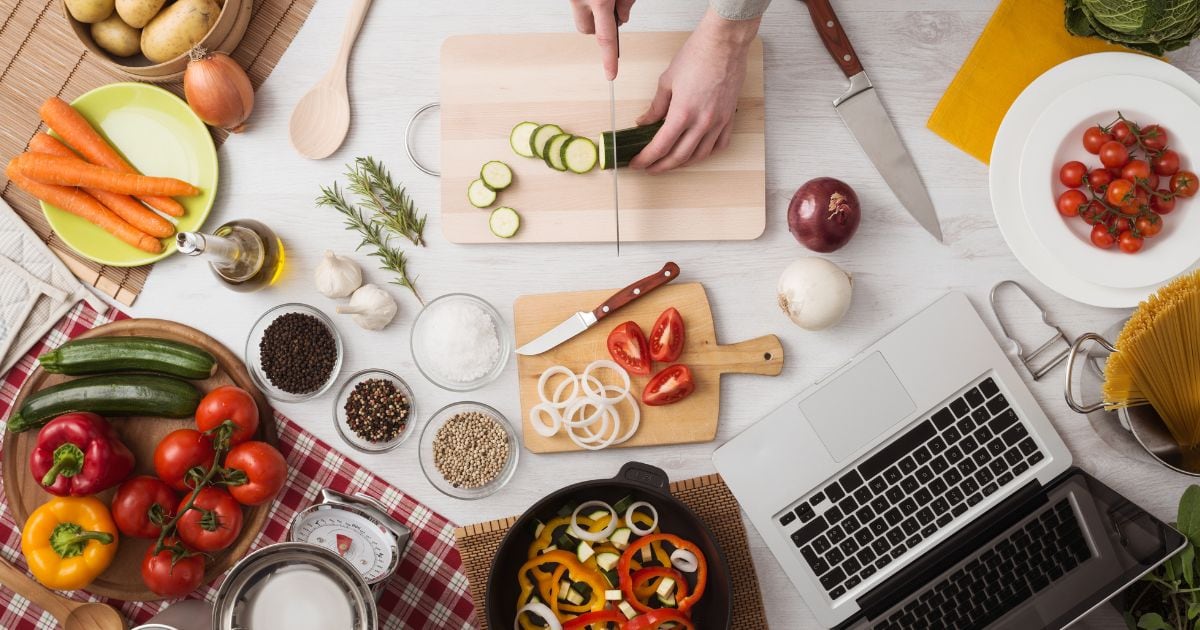Master the art of healthy meal prep to enhance well-being, control food choices, and maintain a balanced diet. Equip yourself with tools like a sharp knife, cutting board, and food containers. Plan your week with nutritious, organized meals, including fruits, veggies, lean proteins, and whole grains. Shop efficiently by planning ahead, sticking to a budget, and buying in bulk. Save time with batch cooking and smart storage solutions. Overcome challenges by prepping ahead, using time-saving gadgets, and opting for simple recipes. Elevate your health journey by exploring the ultimate guide to healthy meal prep.
Key Takeaways
- Plan meals for balanced nutrition and time efficiency.
- Utilize essential tools like a sharp knife and food containers.
- Efficient grocery shopping with a detailed list and budget.
- Batch cooking saves time; freeze and label for freshness.
- Proper storage in airtight containers maintains meal quality.
Benefits of Healthy Meal Prep
By incorporating healthy meal prep into your routine, you can improve your overall well-being and make nutritious eating more convenient. Planning and preparing your meals in advance has numerous benefits. First, it allows you to have better control over your food choices, ensuring that you consume a well-balanced diet rich in essential nutrients. Second, by intentionally selecting ingredients, you can avoid unhealthy options and unnecessary additives commonly found in processed foods.
In addition, meal prepping can help you save time during the week. Spending a few hours on the weekend to prepare meals can save you valuable time during busy weekdays. This not only reduces stress but also prevents impulsive food choices when you’re short on time or energy. Healthy meal prep can also be cost-effective as buying ingredients in bulk and preparing meals at home is often cheaper than eating out or buying pre-packaged meals.
Essential Meal Prep Tools
To efficiently engage in healthy meal prep, you’ll require several essential tools to streamline the process and guarantee successful meal preparation. Having the right equipment can make a significant difference in how smoothly and quickly you can prepare your meals for the week. Here are five vital meal prep tools to contemplate:
- Sharp Chef’s Knife: A high-quality, sharp chef’s knife is essential for cutting and chopping various ingredients quickly and efficiently.
- Cutting Board: A durable cutting board provides a stable surface for chopping fruits, vegetables, and meats without damaging your countertops.
- Food Storage Containers: Invest in a variety of food storage containers in different sizes to store prepped ingredients and meals neatly in the fridge or freezer.
- Slow Cooker or Instant Pot: These kitchen appliances are excellent for preparing large batches of soups, stews, or proteins with minimal effort.
- Meal Prep Bag: A reliable meal prep bag with compartments can help you organize and transport your prepped meals conveniently.
Planning Your Weekly Meals
When planning your weekly meals, focus on menu selection and time management. By choosing balanced, nutritious meals in advance, you can streamline your grocery shopping and meal preparation processes.
This approach helps you stay organized and committed to your healthy eating goals throughout the week.
Menu Selection
When planning your weekly meals for healthy meal prep, consider diversifying your menu selection to guarantee a well-rounded and balanced diet. Here are some tips to help you create a varied and nutritious meal plan:
- Include a variety of fruits and vegetables in different colors to ensure a wide range of nutrients.
- Incorporate lean proteins such as chicken, fish, tofu, or legumes for muscle repair and growth.
- Choose whole grains like quinoa, brown rice, or whole-wheat pasta for sustained energy levels.
- Don’t forget healthy fats from sources like avocados, nuts, and olive oil to support brain function and heart health.
- Experiment with herbs, spices, and seasonings to enhance the flavor of your dishes without relying on excessive salt or sugar.
Time Management
For efficient meal planning, consider breaking down your weekly schedule into manageable chunks to allocate time for preparing nutritious meals ahead of time. Start by selecting recipes that can be prepped in advance, such as soups, stews, or grain bowls.
Dedicate a specific day each week to planning your meals, creating a grocery list, and doing the shopping. Chop vegetables, marinate proteins, and cook grains in bulk to streamline the process. Use tools like slow cookers, instant pots, or sheet pans to save time and effort.
Efficient Grocery Shopping Tips
When it comes to efficient grocery shopping, the key is to plan your meals ahead, stick to your budget, and buy in bulk.
By planning your meals in advance, you can create a shopping list that guarantees you only purchase what you need.
Sticking to your budget and buying in bulk can help you save money in the long run.
Plan Meals Ahead
To efficiently shop for groceries, consider planning your meals ahead, ensuring you have a well-thought-out list to streamline your shopping experience. Here are some tips to help you with efficient grocery shopping:
- Check your pantry: Take inventory of what you already have to avoid buying duplicates.
- Plan your meals: Outline your meals for the week to know exactly what ingredients you need.
- Create a detailed list: Organize your list by sections in the store to save time.
- Stick to your list: Avoid impulse purchases by staying focused on what you need.
- Consider sales and discounts: Look for deals on healthy ingredients to save money while eating well.
Stick to Budget
Staying within your budget while grocery shopping requires strategic planning and mindful decision-making to make the most of your food dollars. To maximize your budget, start by creating a shopping list based on your meal plan. This will help you avoid impulse purchases and stick to what you need.
Compare prices at different stores and consider using coupons or shopping during sales to save money. Opt for generic brands or buy in-season produce for cost-effective choices. Additionally, buying in bulk for items you frequently use can also help lower costs in the long run.
Buy in Bulk
Maximize your grocery shopping efficiency by considering purchasing items in bulk, a cost-effective strategy that can help you save money in the long term. Buying in bulk not only saves you money but also reduces the frequency of your grocery store visits. Here are five items you should consider buying in bulk:
- Grains: Stock up on rice, quinoa, oats, and pasta.
- Legumes: Purchase dried beans, lentils, and chickpeas in bulk.
- Nuts and Seeds: Buy almonds, chia seeds, flaxseeds, and walnuts in larger quantities.
- Spices: Opt for bulk spices to season your meals without breaking the bank.
- Frozen Fruits and Vegetables: Buy frozen berries, broccoli, and mixed vegetables for convenient and longer-lasting options.
Buying these items in bulk can save you time and money and ensure that you always have essential ingredients on hand for your healthy meal prep.
Time-Saving Meal Prep Techniques
For efficient meal prep, consider incorporating these time-saving techniques into your routine.
First, invest in quality food storage containers that are easy to stack and store. Having the right containers will make it easier to portion out meals and store them properly.
Another time-saving tip is to pre-cut your veggies and fruits in advance. Spending a little time chopping them all at once can save you precious minutes during the week when preparing meals.
Additionally, consider cooking in batches. Prepare larger quantities of staples like rice, quinoa, or chicken that can be used in multiple dishes throughout the week. This way, you can save time on cooking and cleaning up on a daily basis.
Utilizing kitchen gadgets like a slow cooker or instant pot can also be a game-changer. These devices allow you to set and forget your meals, freeing up your time for other tasks.
Healthy Meal Prep Recipes
To kickstart your healthy meal prep journey, try incorporating these nutritious and easy-to-make recipes into your weekly routine. These recipes are designed to provide you with balanced meals that aren’t only delicious but also simple to prepare. Here are five meal prep ideas to get you started:
- Quinoa Salad with Chickpeas and Veggies: Cooked quinoa mixed with roasted chickpeas, colorful bell peppers, cucumbers, and a zesty vinaigrette.
- Sheet Pan Lemon Herb Chicken with Roasted Vegetables: Seasoned chicken breasts baked with a mix of seasonal vegetables, such as carrots, broccoli, and red potatoes.
- Turkey and Black Bean Stuffed Bell Peppers: Bell peppers filled with a mix of lean ground turkey, black beans, corn, and spices, topped with melted cheese.
- Mason Jar Greek Salad: This layered salad with cherry tomatoes, cucumbers, olives, feta cheese, and a homemade Greek dressing is perfect for grab-and-go lunches.
- Salmon and Asparagus Foil Packs: Fresh salmon fillets seasoned with herbs, lemon, and garlic, cooked alongside asparagus spears in convenient foil packets.
Batch Cooking for Success
When it comes to successful meal prep, mastering batch cooking techniques can save you valuable time during the week.
Understanding storage solutions for prepped ingredients is essential to uphold freshness and quality.
Incorporating a variety of batch-cooked meals guarantees you have a diverse and exciting menu to look forward to each day.
Time-Saving Batch Techniques
Maximize efficiency in your meal preparation by implementing time-saving batch techniques for successful batch cooking. Here are some tips to help you streamline your meal prep process:
- Plan Ahead: Create a meal plan for the week to know exactly what you need to cook.
- Prep Ingredients in Bulk: Chop vegetables, marinate proteins, and cook grains in large batches.
- Utilize Slow Cookers or Instant Pots: These appliances can help you cook large quantities of food with minimal effort.
- Freeze Portions: Divide meals into individual portions and freeze them for quick and easy access.
- Label and Date: Properly mark and date your prepped meals to guarantee freshness and easy identification.
Storage Solutions for Prep
For efficient meal prep success through batch cooking, consider implementing strategic storage solutions to maintain the freshness and organization of your prepped ingredients and meals.
Invest in a variety of air-tight containers in different sizes to store individual ingredients or full meals. Glass containers are ideal for reheating and storing food safely. Label containers with the date of preparation to guarantee you use the oldest items first.
Utilize stackable containers to save space in your fridge or freezer. Ziplock bags are great for storing portioned ingredients or sauces. Consider investing in a vacuum sealer to prolong the shelf life of your prepped meals.
Proper storage solutions will help you stay organized and make mealtime a breeze.
Variety in Batch Meals
To guarantee a diverse range of flavors and nutrients in your batch meals, consider incorporating various proteins, vegetables, and grains into your meal prep routine. Here are some suggestions to add variety and keep your meals exciting:
- Grilled chicken breast marinated in lemon and herbs
- Roasted sweet potatoes with a sprinkle of cinnamon
- Quinoa mixed with chopped bell peppers and cucumbers
- Stir-fried broccoli and snap peas in a light soy sauce
- Baked salmon seasoned with garlic and dill
Proper Meal Storage Practices
Curious about how to guarantee your meals stay fresh and safe for consumption? Proper meal storage practices are essential to maintain the quality and safety of your prepped meals. To ensure your efforts in meal prep pay off, follow these evidence-based guidelines.
Firstly, invest in airtight containers to store your meals. These containers help prevent air and moisture from seeping in, keeping your food fresh for longer periods. Additionally, consider portioning your meals into individual containers to grab and go easily.
When storing your meals in the refrigerator, make sure to place them in the coolest part, usually the back of the fridge. This helps maintain a consistent temperature and prevents food from spoiling too quickly. Remember to label your containers with the date of preparation to track freshness.
For meals that you plan to freeze, use freezer-safe containers or bags to prevent freezer burn. Properly sealed containers will keep your meals tasting delicious even after being frozen. By following these storage practices, you can enjoy healthy and convenient meals throughout the week.
Overcoming Common Meal Prep Challenges
Overcoming common meal prep challenges requires strategic planning and efficient time management. To tackle these obstacles effectively, consider the following tips:
- Plan Ahead: Take time to create a meal plan for the week, including recipes and a shopping list.
- Prep in Batches: Dedicate specific days for prepping ingredients, cooking meals, and storing them properly.
- Use Time-Saving Tools: Invest in kitchen gadgets like a slow cooker, instant pot, or food processor to streamline the prep process.
- Opt for Simplicity: Choose recipes that are easy to make and require minimal ingredients to save time and reduce stress.
- Embrace Freezer Meals: Prepare meals in bulk and freeze individual portions for quick and convenient options on busy days.
Tracking Progress and Adjusting
For effective meal prep, monitoring your progress and making adjustments as needed is essential to maintain consistency and reach your health and nutrition goals. One practical way to track your progress is by keeping a food journal. Write down what you eat, portion sizes, and how you feel after meals. This can help you identify patterns, such as which foods make you feel energized or sluggish.
Additionally, monitoring your weight and body measurements or even taking progress photos can provide tangible evidence of your journey. Remember, progress isn’t just about the numbers on the scale but also how you feel mentally and physically.
If you notice areas where you’re not seeing the results you want, be proactive in making adjustments. This could mean modifying your meal prep recipes, increasing physical activity, or seeking advice from a nutritionist or health professional. The key is to be flexible and willing to adapt your meal prep routine to best suit your body’s needs and your overall well-being.
Tracking progress and adjusting accordingly will help you stay on track and make sustainable changes for a healthier lifestyle.
Conclusion
To sum up, embracing healthy meal prep is key to achieving your wellness goals. By investing in essential tools, planning your meals, and mastering time-saving techniques, you can set yourself up for success.
Remember to track your progress, adjust as needed, and overcome any challenges that may arise. With dedication and consistency, you can enjoy the benefits of nutritious, delicious meals that support your overall health and well-being.
Keep up the good work, and enjoy the rewards of your efforts!




